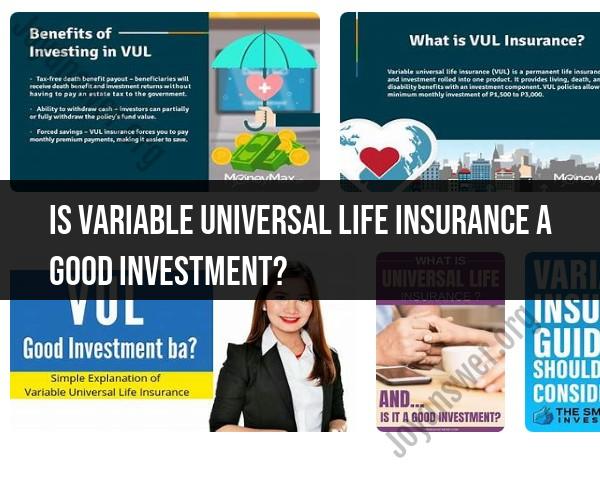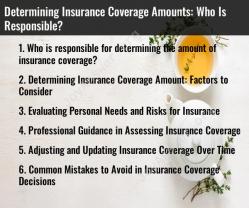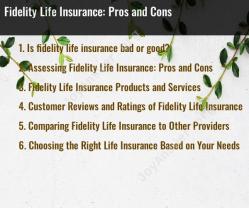Is variable universal life insurance a good investment?
Variable Universal Life (VUL) insurance is a type of life insurance policy that combines a death benefit with an investment component. Whether VUL is a good investment for you depends on your financial goals, risk tolerance, and specific circumstances. Here are some factors to consider when evaluating VUL as an investment:
Pros of Variable Universal Life Insurance:
Death Benefit: VUL provides a death benefit to your beneficiaries, which can provide financial security in the event of your death.
Investment Component: VUL policies allow you to invest in a variety of sub-accounts, which are similar to mutual funds. This gives you the potential for investment growth over time.
Tax Benefits: The cash value of a VUL policy can grow tax-deferred, meaning you won't pay taxes on the gains as long as the money stays within the policy. Additionally, withdrawals and loans from the policy may be tax-free up to the amount you've contributed.
Flexibility: VUL policies often offer flexibility in terms of premium payments and death benefit amounts. You can adjust your premiums and coverage to fit your changing financial situation.
Cons of Variable Universal Life Insurance:
Costs: VUL policies can be expensive. They typically have high fees, including mortality and expense charges, administrative fees, and investment management fees. These costs can significantly reduce the returns on your investments.
Risk: Because the cash value of a VUL policy is invested in the market, it's subject to market fluctuations. If the investments perform poorly, the cash value and death benefit may decrease.
Complexity: VUL policies are complex and may be challenging to understand for the average person. It's essential to have a good grasp of the policy's terms, fees, and investment options.
Surrender Charges: If you decide to cancel or surrender the policy within the first few years, you may incur surrender charges that reduce the amount you receive.
Insurance vs. Investment: It's important to remember that VUL is primarily an insurance product with an investment component. The investment portion is not the primary focus, and other investment options may offer better returns.
Considerations:
Before considering VUL as an investment, evaluate your financial goals and needs:
Risk Tolerance: Are you comfortable with the potential for investment losses, or do you prefer more conservative investments?
Insurance Needs: Do you need life insurance primarily for protection, or are you using it as an estate planning or tax-advantaged investment tool?
Alternative Investments: Consider whether other investment options, such as retirement accounts (e.g., 401(k) or IRAs) or taxable investment accounts, might better serve your goals.
Consult a Financial Advisor: Given the complexity of VUL policies and the potential costs involved, it's advisable to consult a financial advisor or insurance specialist who can help you assess whether VUL aligns with your overall financial strategy.
In many cases, VUL may not be the most cost-effective or efficient way to invest for retirement or other financial goals. There are typically lower-cost investment options available with a broader range of investment choices. However, VUL may be suitable for individuals who have specific needs for life insurance and a higher risk tolerance for market fluctuations. It's crucial to carefully weigh the pros and cons and consider alternatives before deciding if VUL is a good investment for your situation.
Variable Universal Life Insurance as an Investment: Pros and Cons
Variable universal life (VUL) insurance is a type of permanent life insurance policy that offers both insurance coverage and the potential for investment growth. The investment component of a VUL policy is invested in a variety of subaccounts, which are similar to mutual funds.
Pros:
- Investment potential: VUL policies offer the potential for higher investment growth than other types of life insurance policies, such as whole life insurance.
- Flexibility: VUL policies offer a great deal of flexibility in terms of premium payments, investment options, and death benefits.
- Tax benefits: VUL policies offer some tax advantages, such as tax-deferred growth and tax-free death benefits.
Cons:
- Riskier than other types of life insurance: VUL policies are riskier than other types of life insurance policies because the investment component can lose value.
- Higher fees: VUL policies tend to have higher fees than other types of life insurance policies.
- Complexity: VUL policies are complex products that can be difficult to understand.
Understanding the Investment Component of Variable Universal Life Insurance
The investment component of a VUL policy is invested in a variety of subaccounts, which are similar to mutual funds. Subaccounts can invest in a variety of asset classes, such as stocks, bonds, and money market instruments.
Policyholders can choose how to allocate their investment funds among the different subaccounts. Policyholders can also change their investment allocation at any time.
Comparing Variable Universal Life Insurance to Other Investment Options
VUL policies can be compared to other investment options, such as mutual funds, annuities, and investment accounts.
- Mutual funds: VUL policies are similar to mutual funds in terms of their investment potential and flexibility. However, VUL policies offer some additional benefits, such as tax advantages and life insurance coverage.
- Annuities: Annuities are another type of financial product that offers both investment potential and income. However, annuities are typically less flexible than VUL policies and they may have higher fees.
- Investment accounts: Investment accounts, such as brokerage accounts and IRAs, offer a wide range of investment options and flexibility. However, investment accounts do not offer the same tax advantages or life insurance coverage as VUL policies.
Risks and Rewards of Investing in Variable Universal Life Insurance
The main risk of investing in a VUL policy is that the investment component can lose value. This can happen if the stock market declines or if the bond market experiences rising interest rates.
However, VUL policies also offer the potential for higher investment growth than other types of life insurance policies. This is because the investment component of a VUL policy can invest in a variety of asset classes, including stocks.
Making Informed Investment Decisions with Variable Universal Life Insurance
VUL policies can be a complex financial product. It is important to understand the risks and rewards before investing in a VUL policy.
Policyholders should carefully consider their investment goals and risk tolerance before choosing a VUL policy. Policyholders should also compare the fees and investment options offered by different VUL policies before making a decision.
It is also important to work with a financial advisor who can help you choose the right VUL policy for your individual needs.
Conclusion
VUL policies can be a good option for investors who are looking for both life insurance coverage and the potential for investment growth. However, it is important to understand the risks and rewards before investing in a VUL policy.













